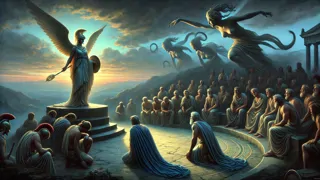Introduction
In the land of Argos, beneath the shadowed columns of the Mycenaean palace, fate stirred restlessly. The air always seemed heavy with prophecy—thick with the perfume of olive groves and the copper tang of old blood. Mycenae, ancient city of gold, had seen its share of triumph and sorrow, but none so tangled as the curse that haunted the House of Atreus. Here, pride and vengeance were woven deep into marble floors and high, echoing halls. Legends whispered of Agamemnon’s triumph at Troy and of the price paid at home—of a family bound together and torn apart by ancient wrongs, divine warnings, and the irresistible pull of destiny. The gods watched, their hands unseen but ever present. The palace itself, half in sunlight and half in shadow, bore silent witness to the tragedies that would define the very nature of justice. In this world, right and wrong were not simple matters, and blood cried out for blood until the earth could bear it no longer. In the dark hours before dawn, a watchman gazed out from the palace roof, straining to catch the first flicker of signal fire that would announce the end of a war and the return of a king. He did not know that this same flame would ignite a chain of betrayals, setting in motion a cycle of revenge that would reshape the laws of gods and men alike. This is the story of Agamemnon and Clytemnestra, of Orestes and Electra—of guilt, rage, and the fragile hope for peace. In the Oresteia, the very heart of Greek tragedy beats—heavy with questions that still echo in the courts and consciences of the world.
I. Agamemnon’s Return: The Shadow of Triumph
The long war had ended, but peace was as fragile as a dropped goblet. Mycenae stirred to life with news that King Agamemnon, commander of the Greeks, approached at last. Ten years had passed since he sailed for Troy, ten years since he’d sacrificed his daughter Iphigenia for a wind to carry his ships. Rumors swept through the palace like wildfire, igniting old fears and resentments. Clytemnestra, queen and mother, ruled the household with icy resolve. In Agamemnon’s absence, she became steel—her gaze sharp as a blade, her words measured and cold. She had not forgiven her husband for Iphigenia’s death. Some whispered of her secret lover, Aegisthus, of dark plots and whispered curses.

The city’s elders gathered at the palace gates, robes dusted with ash, their faces lined by years and regret. As the sun dipped toward afternoon, a distant procession wound its way to the citadel: Agamemnon’s chariot gleaming, Cassandra—Trojan princess and prisoner—beside him. Trumpets sounded. Clytemnestra descended from the palace, robes flowing, her expression unreadable. She greeted her husband with formal courtesy, masking every emotion beneath the practiced mask of a queen. “My lord, Mycenae welcomes you,” she said, voice honeyed and cool. “May the gods reward you for Troy’s fall.”
Agamemnon, weary and proud, entered his home. He did not notice the flicker of fear in Cassandra’s eyes or the tightness in his wife’s jaw. The city feasted, wine spilling like hope across stone floors, but the queen’s heart was far from celebration. As twilight thickened, she guided Agamemnon into the bathhouse. Clytemnestra’s hands were steady as she draped purple tapestries—a gesture of honor, or perhaps a burial shroud. In a moment lost to time, she struck: the blade flashed, the king’s blood staining marble and linen. Cassandra screamed, but met her own fate at the queen’s hand.
The elders rushed to the scene, horror etched deep in their bones. Clytemnestra stood unbowed above the fallen bodies, crimson droplets tracing her arms. “Justice has been served,” she declared, voice ringing through stone corridors. “Let the curse of Atreus end here.” But vengeance breeds only more sorrow. In the darkness beyond Mycenae’s walls, Orestes—exiled son—felt a shudder in his soul, as if the very earth called him home.
II. The Children of the House: Orestes and Electra
Exile shaped Orestes as surely as blood. From boyhood he wandered foreign lands, haunted by nightmares of his father’s murder and his mother’s voice echoing in dreams. Only Electra, his sister, remained within the palace—her hope a flickering ember amid cold marble and dangerous whispers. Clytemnestra ruled with Aegisthus at her side. The city knew peace, but it was brittle, sustained by fear and denial. Electra moved like a shadow through the palace: she mourned her father openly, refusing to bow before her mother’s throne. Each day she poured libations at Agamemnon’s grave, prayers tangled with longing and rage.

Years passed. Orestes, now a man, returned in secret to Argos. Guided by Apollo’s oracle and driven by the voice of vengeance, he slipped into the city beneath a cloak of night. At the tomb of Agamemnon, brother and sister met again—tears mingling with the dust of their father’s resting place. “Blood must answer blood,” whispered Electra, eyes fierce and hollow. Orestes hesitated. The gods demanded justice, but what was justice if it left him cursed and alone?
Still, he could not turn away. With Electra’s help, he plotted his return to the palace, disguising himself as a foreign traveler bearing news of Orestes’ own death. Clytemnestra received him coolly, suspecting nothing. Yet guilt gnawed at her heart; dreams of blood and fire shattered her sleep. When Orestes revealed himself, Aegisthus fell first—caught unawares, pleading for mercy. Then Orestes confronted his mother. The moment stretched—an eternity of love, betrayal, duty. Clytemnestra begged for her life, invoking the bond between mother and son. Orestes, torn by agony, delivered the fatal blow. The house of Atreus was awash in blood once more.
But peace did not follow. As Orestes stood above his mother’s body, a new terror awoke: the Furies—ancient goddesses of vengeance—rose from the darkness, their eyes burning with righteous wrath. They hounded Orestes from the palace, their cries echoing through the night, relentless as guilt itself.
III. The Trial of Orestes: The Birth of Justice
Fleeing Argos, Orestes wandered through a world grown hostile and strange. The Furies—black-robed, hair writhing with serpents—gave him no rest. Day and night, their cries poisoned his mind, their clawed hands reaching for his soul. He sought sanctuary at Delphi, collapsing before Apollo’s altar. The god appeared to him in a blaze of golden light: “You have avenged your father as I commanded. But mortal justice ends in suffering if left to itself. You must seek judgment in Athens, before wise Athena.”

Driven by hope and desperation, Orestes journeyed to Athens. The Furies followed, relentless as fate. Athena herself descended to the Areopagus—a sacred hill above the city—summoning the first court of mortals to decide Orestes’ fate. Twelve citizens gathered, trembling beneath the gaze of gods and spirits. The Furies demanded vengeance for the mother’s blood; Apollo argued for mercy, citing Orestes’ duty as a son and avenger. The city held its breath.
The trial unfolded beneath a sky streaked with clouds. Arguments clashed like thunder: blood ties against blood debts, mercy against tradition. Athena listened—eyes calm as still water, her wisdom shaping every word. At last the votes were cast. The scales balanced: six for guilt, six for acquittal. Athena declared, “When reason cannot decide, let mercy prevail.” She freed Orestes from the curse, promising the Furies a place of honor as protectors of justice rather than agents of revenge.
The air changed. The Furies’ screams faded into blessing; the ancient darkness lifted from Orestes’ soul. Athens rejoiced, not merely at a man’s salvation, but at the birth of a new order: law above vengeance, reason above rage. The house of Atreus would bleed no more. In the dawn that followed, Orestes stood atop the city’s highest hill. He gazed east, toward a future where even the deepest wounds might one day heal.
Conclusion
The Oresteia is more than the chronicle of a cursed house—it’s a reflection of humanity’s struggle to rise above endless cycles of violence. In ancient Mycenae, vengeance was once sacred; blood demanded blood, and old wrongs returned in the night to claim new victims. Yet from the carnage and sorrow, a different future took root—a world where justice could be weighed by reason, where mercy offered an end to suffering. Athena’s wisdom transformed the relentless Furies into guardians of the law, their rage turned to righteous protection of the innocent. Orestes was freed not by forgetting his crime, but by facing it in the light of a new order. The tragic fates of Agamemnon, Clytemnestra, and Orestes remind us that justice is never simple; it asks for courage, humility, and change. Their story echoes across ages—in every court where guilt and mercy contend, in every heart longing for peace after pain. Mycenae’s shadows linger, but so does its hope: that even the darkest past can lead to dawn, and that true justice is born not in vengeance, but in wisdom and compassion.


















